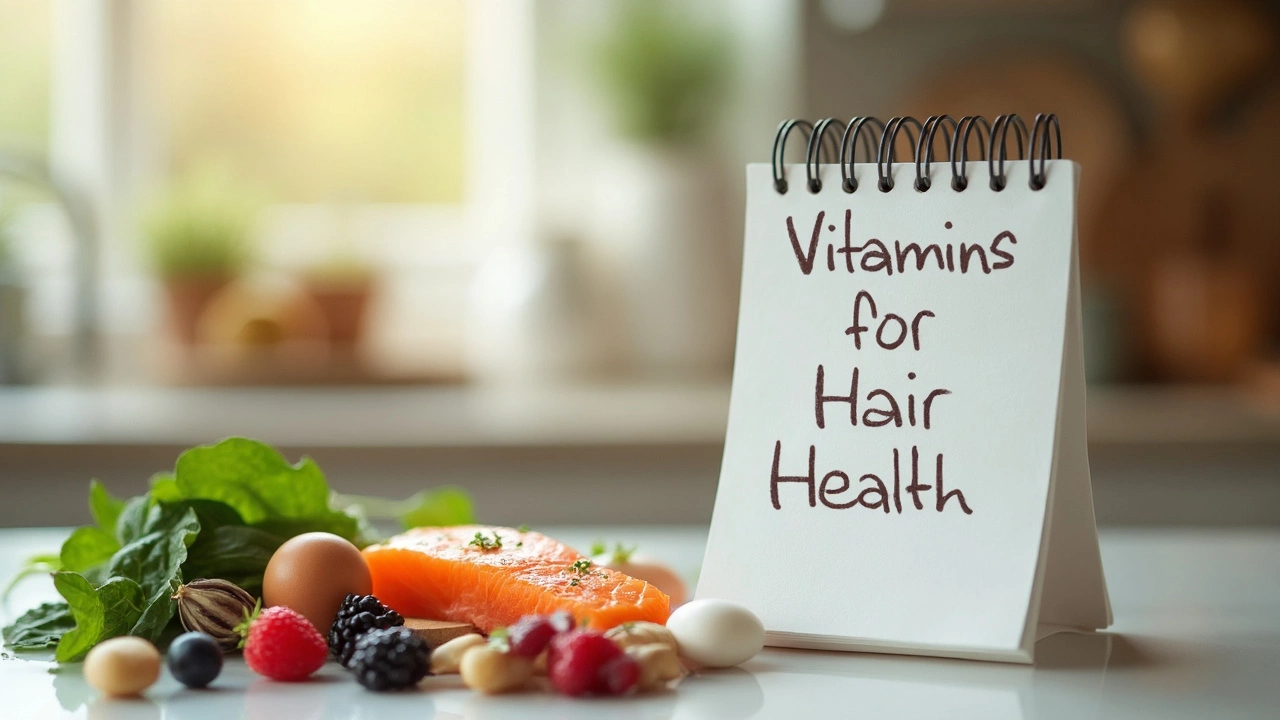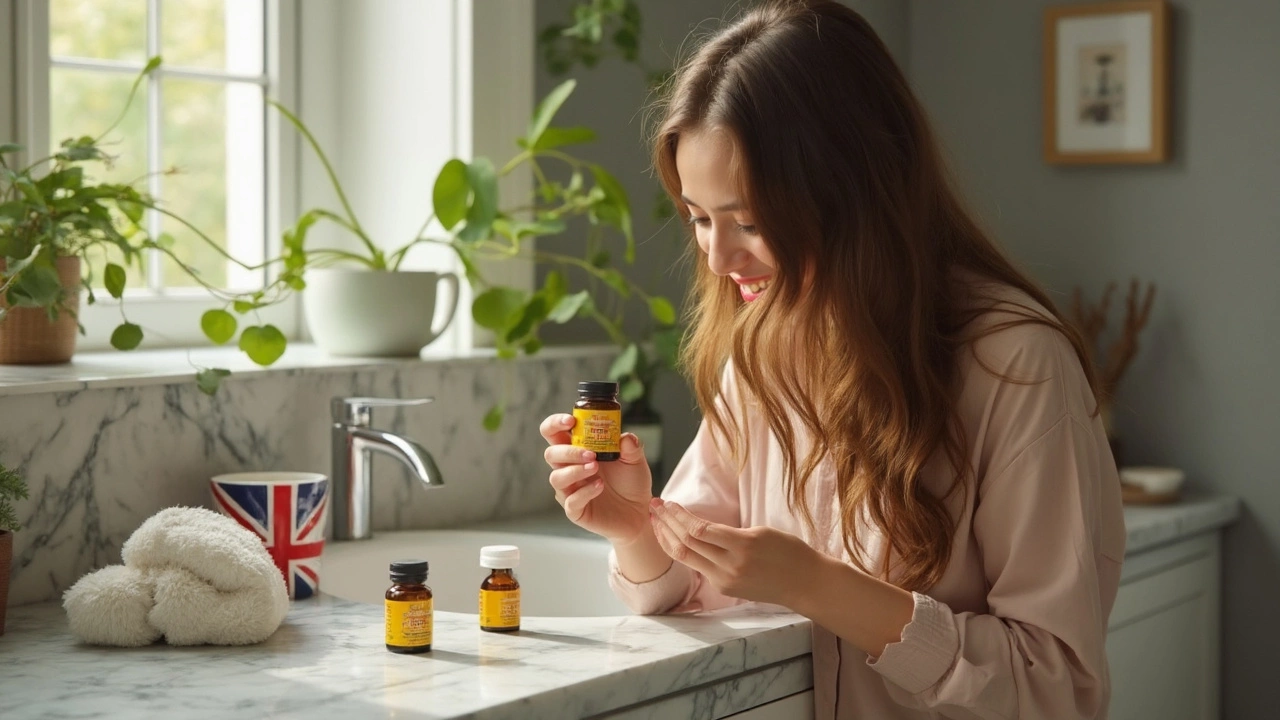Ever stood in front of a mirror and wished your hair would just hurry up and grow already? You’re not alone. We all see shampoos and gummies promising magic, but here’s the actual scoop: some vitamins really can make a difference for hair growth, but it’s not as easy as popping a pill and waking up to Rapunzel-length hair. Let’s talk about what works and what’s just hype.
The first thing you should know? Hair needs more than just good genetics. It grows from the inside out—starting in those roots on your scalp that are hungry for nutrients. And yep, certain vitamins matter a lot more than others when it comes to how your hair feels, looks, and grows.
If you’re tired of spending on fancy bottles without results, it pays to know what ingredients to look for, why they matter, and how to tell if your hair is missing something important. We'll break down the real game-changing vitamins, how to spot them in hair care products, and what daily habits actually help you get the thicker, healthier hair you want.
- The Science: What Your Hair Really Needs
- Vitamins That Make a Difference
- Choosing Hair Products With the Right Vitamins
- Smart Habits for Faster Hair Growth
The Science: What Your Hair Really Needs
Before you grab another “miracle” shampoo, it helps to know what your hair needs to actually grow. Hair is mostly made of a protein called keratin. For strong, shiny hair, your body has to be in good shape and well-fed—so what you eat and the nutrients you get play a big role.
Your scalp is basically a garden for your hair. Each strand grows from a tiny follicle under your skin, and these follicles need a steady supply of blood. That blood carries nutrients like proteins, vitamins, and minerals right where they’re needed for hair to grow. Slip up on those essentials, and hair gets dry, thin, or starts falling out faster than you want.
Here are the basics your hair can’t live without:
- Vitamin for hair growth (like Biotin, Vitamin D, and B-Vitamins)
- Protein—keratin factories need building blocks
- Iron—helps your blood carry oxygen to those follicles
- Zinc—helps fix tissue and keeps oil glands in check
If you’ve ever noticed hair shedding after a stressful time, or from a crash diet, you’ve seen what happens when your body doesn’t get enough nutrients. Hair is the last thing your body puts resources toward when you’re running low, so proper nutrition really is non-negotiable for thick, healthy hair. Not getting enough of the right stuff? Your hair will let you know, sometimes pretty quickly. That’s why eating well and picking smart hair care products is key if you want to keep your hair game strong.
Vitamins That Make a Difference
When it comes to what actually fuels vitamin for hair growth, a few names pop up over and over. The classic one everyone talks about is biotin (B7), but that’s just the start. Here’s a breakdown of what each major vitamin does for your hair, and what happens if you don’t get enough.
- Biotin (Vitamin B7): Probably the most talked-about, with some good reason. Biotin helps make keratin, which is the protein your hair is literally made of. Deficiency is rare but if you’re low, your hair can get thin or even fall out. You’ll find biotin in eggs, salmon, nuts, and whole grains. Most hair supplements on drugstore shelves have this front and center.
- Vitamin D: This one doesn’t just help your bones. Low vitamin D is linked to hair loss—especially a type called telogen effluvium where more hairs than usual shed all at once. The easiest way to boost it? Head outside, or add things like fortified milk and mushrooms to your meals.
- Vitamin E: Antioxidants help fight off damage from UV rays, pollution, and just life in general. Vitamin E does this for your scalp, which keeps hair roots happy. Some studies found people with hair loss had noticeably less vitamin E in their bodies than others. Try avocados, sunflower seeds, or spinach to get more of it.
- Vitamin A: Your skin makes sebum (natural oil) because of vitamin A. Healthy sebum means your scalp isn’t dry or itchy, and your hair stays coated and smooth. But don’t overdo it—too much vitamin A can actually trigger hair loss.
- B Vitamins (Besides Biotin): B12, folate, and B6 all help make red blood cells, which carry oxygen and nutrients to the scalp. With low B12, hair growth can totally stall. B12 can be trickier to get if you’re vegan, so keep an eye on those levels if that’s your lifestyle.
- Vitamin C: Collagen is another big piece of hair, and vitamin C helps your body produce it. Plus, it makes it easier to absorb iron—a mineral your hair truly needs to grow. Citrus fruits, bell peppers, and strawberries give you plenty per bite.
Here’s a quick reference on vitamins and how they impact your hair growth:
| Vitamin | Primary Function for Hair | Common Food Sources |
|---|---|---|
| Biotin | Builds keratin, prevents thinning | Eggs, nuts, whole grains |
| Vitamin D | Prevents shedding, stimulates follicles | Sunlight, fortified milk, mushrooms |
| Vitamin E | Protects roots, supports scalp | Avocado, sunflower seeds, spinach |
| Vitamin A | Regulates oil, avoids dryness | Sweet potatoes, carrots, dark greens |
| Vitamin B12 | Promotes blood supply to scalp | Fish, dairy, fortified cereals |
| Vitamin C | Makes collagen, helps absorb iron | Oranges, strawberries, peppers |
If you're eyeing a supplement or picking a shampoo, check for these vitamins in the ingredient list. And don’t forget, real food is usually the best way to get most of them—your body just recognizes nutrients better when they come from your plate than your pill box.

Choosing Hair Products With the Right Vitamins
It’s easy to get overwhelmed in the hair care aisle—every bottle claims it’s life-changing for hair growth. But if you want actual results, checking the ingredient list is a smart move. Let’s get real about which vitamins you should look for in your products, and why.
The MVP in most hair care products is biotin. This B-vitamin shows up everywhere for a reason: research (like the one published in the International Journal of Trichology in 2016) found that some folks with thinning hair had low biotin levels—and their hair improved after taking biotin. But here’s the thing: most people get enough biotin from food, so adding it to shampoos and conditioners mainly helps your hair feel stronger and softer by giving your strands a coating boost.
Vitamin E is another big player—famous for protecting your scalp skin and locking in moisture. Some brands put vitamin E oil right into their serums or leave-in treatments. Shampoos with vitamin C can boost shine and help with thinning, since this vitamin supports collagen, which your hair structure really depends on. Niacin (vitamin B3) often gets overlooked, but it helps bring more blood flow (and nutrients) right to your roots. More nutrients = healthier hair follicles.
Here’s how the common vitamins in hair products stack up, and where you’ll likely spot them:
| Vitamin | How It Helps | Where to Find It |
|---|---|---|
| Biotin (B7) | Strengthens hair, less breakage | Shampoos, conditioners, leave-in sprays |
| Vitamin E | Moisturizes, soothes scalp, adds shine | Hair oils, serums, masks |
| Vitamin C | Helps collagen, improves scalp health | Shampoos, scalp treatments |
| Niacin (B3) | Boosts circulation for growth | Scalp tonics, thickening shampoos |
When you shop, skip the long chemical list you don’t recognize. Focus on these vitamins (they’ll usually show up as ‘biotin,’ ‘tocopherol’ for vitamin E, ‘ascorbic acid’ for vitamin C, or ‘niacinamide’ for niacin). And if your scalp feels dry, pick a vitamin E or C formula; if your hair’s always breaking, go for biotin.
Pro tip: If you’re not seeing changes in a month or two, try switching up your routine—no product works overnight, and hair usually grows about half an inch a month max. Using vitamins in your products won’t work miracles, but picking blends with the right stuff can seriously upgrade how your hair looks and behaves.
Smart Habits for Faster Hair Growth
If you want longer, thicker hair, daily habits matter just as much as which vitamin for hair growth you add to your shopping cart. Forget shortcuts—your hair loves consistency and a few key routines that keep everything at the roots working smoothly.
First thing: eat a balanced diet. Protein, iron, zinc, and biotin are building blocks your hair follicles depend on. For example, a study from the Journal of Clinical and Aesthetic Dermatology showed that iron deficiency is behind many unexplained cases of hair loss, especially in women.
- Eat enough protein: Think eggs, Greek yogurt, chicken, or tofu. Hair is mostly protein, so skimping can slow growing cycles.
- Brush gently: Yanking a comb through wet hair stretches and breaks strands. Use a wide-tooth comb and take your time.
- Skip hot styling tools a few days a week: Blow dryers and straighteners zap away moisture, making breakage way more likely.
- Keep your scalp clean: Build-up from products and sweat can clog pores and slow growth. Wash with a gentle shampoo made for your hair type every few days.
- Don’t skip trims: It sounds backwards, but trimming split ends keeps hair healthy and avoids more breakage in the long run.
If you take supplements, stick to recommended doses. Mega-dosing on vitamins like biotin or vitamin A can sometimes backfire and even lead to shedding. Moderation is key.
| Nutrient | Recommended Amount | Example Food Sources |
|---|---|---|
| Protein | ~50g (adults) | Eggs, Lean Meat, Dairy, Beans |
| Iron | 8-18mg | Spinach, Lentils, Red Meat |
| Zinc | 8-11mg | Pumpkin Seeds, Chickpeas |
| Biotin | 30mcg | Egg Yolks, Nuts, Whole Grains |
| Vitamin D | 600 IU | Salmon, Sunlight, Fortified Milk |
And here’s one thing people overlook: chronic stress messes with your hormones and can push more hairs into the shedding phase. Make time to chill out or move your body, whether it’s a walk, a playlist you love, or just shutting your eyes for ten minutes. Small changes add up fast—so focus on simple, steady habits for the best hair of your life.

